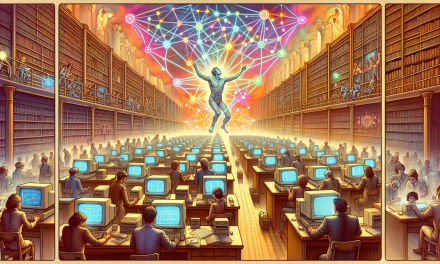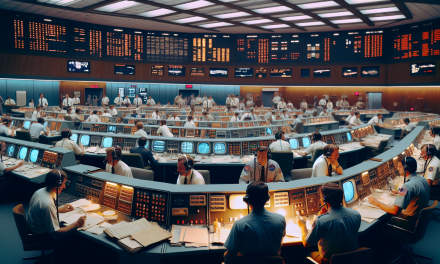Picture this: back in 1996, two Stanford PhD students were frustrated. Larry Page and Sergey Brin weren’t annoyed about homework or campus food—they were irritated by how terrible it was to find anything useful on the internet. The web was like a massive library where all the books had been dumped in random piles, with no catalogue system whatsoever.
Their solution? Create the ultimate librarian that never sleeps, never gets cranky, and somehow knows exactly which book you need before you’ve even finished asking. That librarian became Google, and its brain—the search algorithm—didn’t just organise information. It completely rewired how human knowledge flows around the planet.
The Great Web Sorting Challenge
Before Google showed up, finding information online was like playing a frustrating game of hide-and-seek. Early search engines mostly counted keywords—if you searched for “pizza,” you’d get pages that mentioned “pizza” the most times, regardless of whether they actually helped you find a decent slice.
Page and Brin had a different idea. They thought: what if we treated the web like academic research? In universities, the most important papers are the ones other researchers cite most often. So why not apply this thinking to websites? Their breakthrough insight became PageRank—an algorithm that looked at which sites linked to other sites, treating each link as a vote of confidence.
Think of it like a popularity contest, but for usefulness rather than looks. If lots of respected websites linked to your page about pizza recipes, Google’s algorithm reasoned you probably had genuinely good pizza advice. It was like having millions of people constantly recommending things to each other, with the algorithm keeping track of all those recommendations.
How Algorithms Became Our Information Gatekeepers
Here’s where things get interesting—and a bit complicated. When Google’s search algorithm started working really well, it didn’t just help people find information. It began shaping what information people could find in the first place.
Imagine you’re looking for information about climate change. Google’s algorithm decides which articles, studies, and opinions appear on your first page of results. Those choices—made by mathematical formulas, not humans—influence what millions of people read, think, and believe. The algorithm becomes like an invisible curator in that giant library we mentioned, quietly deciding which books end up at eye level and which get buried in the basement.
This power grew as Google refined its algorithm. They added hundreds of factors: How recent is the information? How fast does the website load? Does it work well on phones? Are people spending time reading it or bouncing away immediately? Each improvement made search results more helpful, but also gave the algorithm more influence over what we see.
The Bright Side of Algorithmic Organization
Let’s be honest—Google’s algorithm has done some genuinely amazing things. It democratised access to information in ways previous generations couldn’t imagine. A student in rural Kenya can access the same medical research as a doctor at Harvard. Small businesses can reach customers worldwide. Curious minds everywhere can learn piano, fix their bicycles, or understand quantum physics, all for free.
The algorithm also got remarkably good at understanding context. Search for “Mercury” and it knows whether you probably mean the planet, the element, or the Queen frontman based on your other search patterns and current events. It can translate languages, find images that match descriptions, and even help you identify that catchy song stuck in your head.
Perhaps most importantly, it made the internet usable. Without algorithmic sorting, the tens of billions of web pages out there would be completely overwhelming. The algorithm transforms chaos into meaningful order, like having a brilliant research assistant who never gets tired of finding exactly what you need.
The Shadow Side: When Algorithms Make Choices
But here’s the thing about having an invisible curator—sometimes you don’t notice what’s missing from the shelves. Google’s algorithm, despite its sophistication, isn’t neutral. It reflects the biases in its training data, the assumptions of its creators, and the patterns of the web itself.
Consider how image searches used to work. For years, searching for “CEO” would return mostly images of white men, while “nurse” returned mostly women. The algorithm wasn’t intentionally sexist or racist—it was simply reflecting patterns it found online. But by reinforcing these patterns, it helped perpetuate them.
The algorithm also creates filter bubbles. If you’ve searched for liberal news sources before, Google might assume you want more liberal content. If you’ve looked at conservative viewpoints, it might push you toward more of those. The algorithm thinks it’s being helpful by showing you “relevant” content, but it might actually be narrowing your worldview rather than expanding it.
The Feedback Loop Effect
Here’s where things get really fascinating: Google’s algorithm doesn’t just reflect what information exists—it influences what information gets created. Website owners study the algorithm like ancient oracles, trying to decode what will make their content rank higher. This creates a feedback loop where content gets optimised for algorithmic preferences rather than human needs.
Think about clickbait headlines. They exist because algorithms noticed people click on dramatic, emotional titles more often. So content creators learned to write “You Won’t Believe What Happened Next!” instead of “Study Shows Modest Improvement in Battery Technology.” The algorithm rewarded engagement, and content evolved to match.
This same dynamic affects news, entertainment, education—pretty much everything online. The algorithm’s preferences gradually reshape the entire information landscape, like a river carving new channels through bedrock over time.
Search as Society’s Operating System
When Page and Brin set out to organise the world’s information, they probably didn’t realise they were building something like an operating system for modern society. Just as your computer’s OS decides which programs can run and how they access resources, search algorithms increasingly determine which ideas get attention and which fade into obscurity.
This isn’t inherently good or bad—it’s simply powerful. The same algorithmic approach that helps a parent find reliable medical information for their child can also amplify misinformation if it’s designed poorly. The technology that connects researchers across continents can also create echo chambers that polarise communities.
Understanding this power matters because algorithms are everywhere now, not just in search. Social media feeds, shopping recommendations, job matching, loan approvals, and even criminal justice decisions increasingly rely on algorithmic sorting. Google’s search algorithm was just the beginning of a much larger transformation in how information moves through society.
The next time you search for something online, take a moment to wonder: What didn’t show up in your results? What assumptions is the algorithm making about what you want to see? What invisible choices are shaping the information landscape around you? These aren’t just technical questions—they’re questions about how we navigate truth, knowledge, and understanding in an algorithmic age.








